Watch the Agro-Cyclos presentation video in a short and at an extended version.
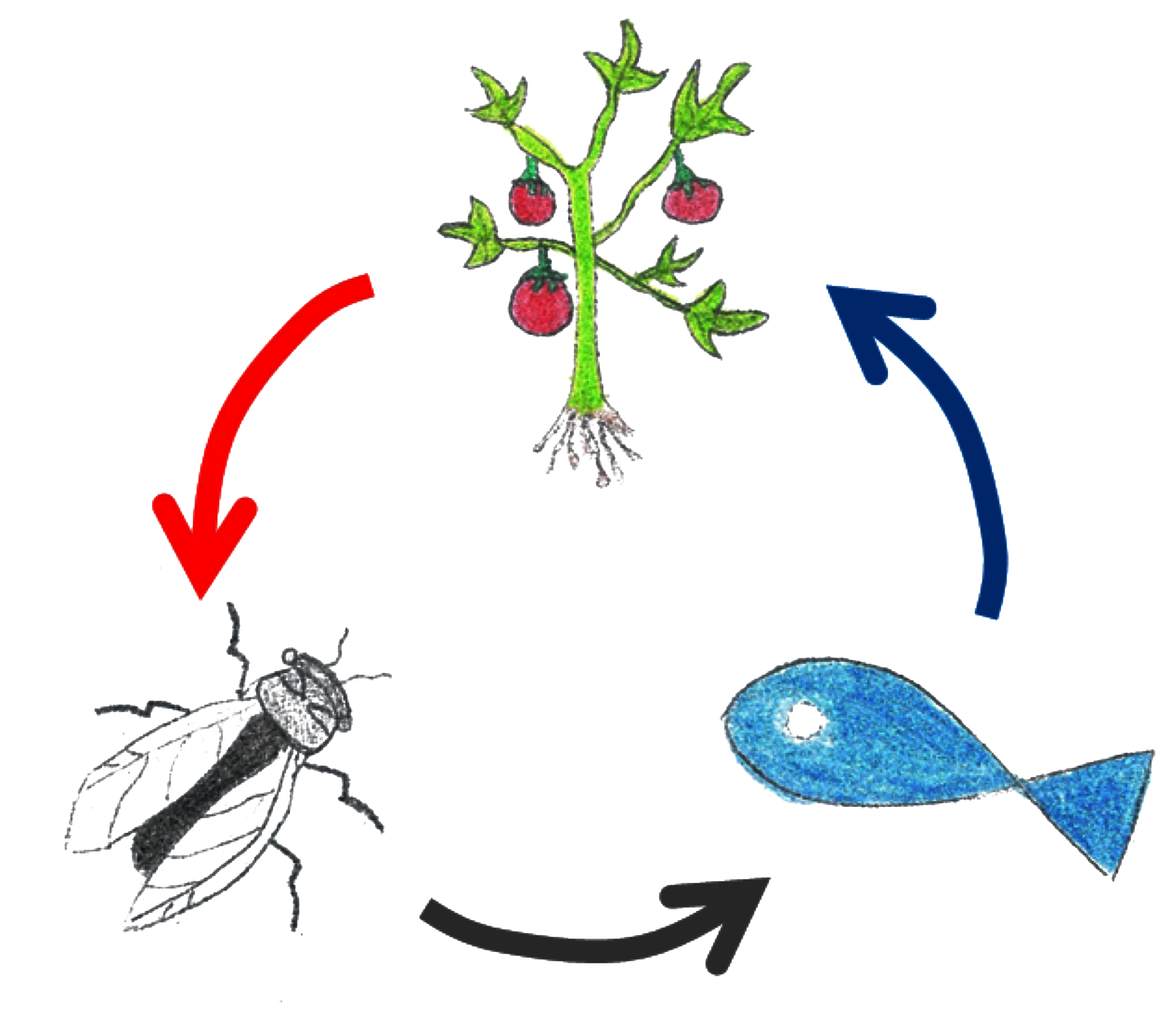
Circular economy in agricultural production: the cycle of nutrition between plants, fish and insects as a new system of food production with a low environmental footprint (Agro-Cyclos)
Funding Programme "NATURAL ENVIRONMENT & INNOVATIVE ACTIONS 2022" / Priority Axis 3 "RESEARCH AND APPLICATION"
Funding: Green Fund (https://prasinotameio.gr)
Budget: 199991 €
Department of Agriculture Crop Production and Rural Environment, University of Thessaly, Volos, Greece
2023-2025
Agro-Cyclos focuses the multi-level concept of the circular economy on primary production, applying a pioneering circular tri-trophic model that includes three types of organisms (plants, fish and insects) that feed each other. The aim of the project is to apply the principles of the circular economy to the production of agricultural products, through the reuse of nutrient-rich materials that have so far been considered waste. By joining the cycle of nutrition, the residues or by-products of the metabolism of one organism will become food for the next, turning them from waste into a resource.
The objectives of the project are two-fold: a) to create new knowledge through research on the implementation of the circular production system, the completeness of which will provide the roadmap for its introduction in the primary sector and b) to transfer knowledge/technology, to inform and raise awareness among producers, primary sector enterprises and citizens about the new model which is contrary to the current linear model of development.
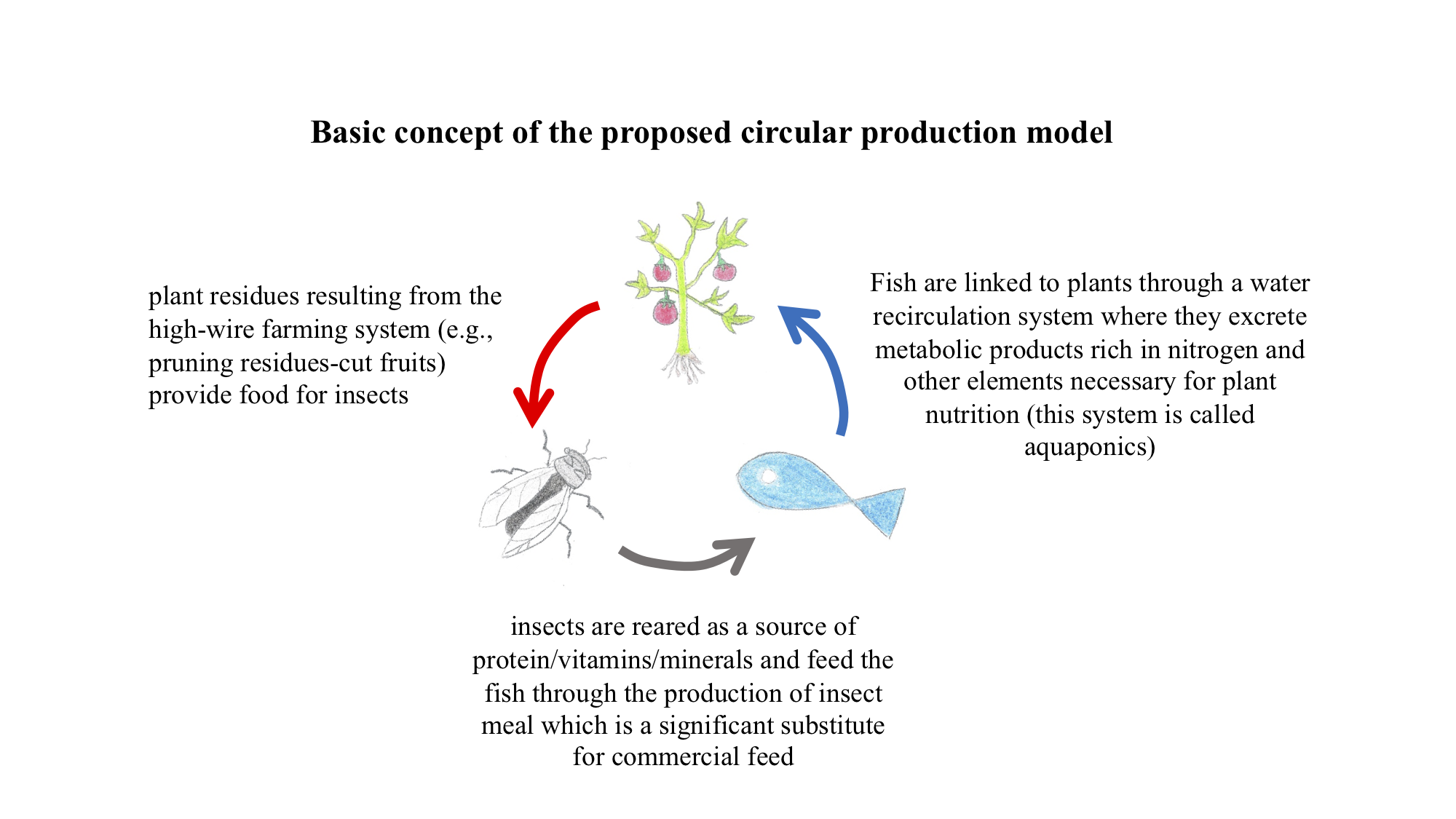
The integration of aquaculture, aquaponics and insect rearing in the cyclical tri-rotational farming system will lead to maximize nutrient, water and energy recycling, minimizing waste.
The expected results, along with the application of the "nothing is discarded-everything is reused" principle to maximize the production of agricultural products and fish, include: a) the reduction of environmental pollution from waste disposal (a serious problem in large production units of either aquaculture or greenhouse products), b) the saving of environmental resources, mainly water, which is the cohesive element of parallel vegetable/fish farming (carrying valuable nutrients), c) the reduction of the use of chemical fertilizers and the promotion of organic nutritional products.
All Agro-Cyclos aspects are summarized in the video-recorded material provided in a short and also at an extended version.
Efi Levizou, Associate Professor in Plant Physiology, Department of Agriculture Crop Production and Rural Environment, University of Thessaly, Volos, Greece
Christos Athanasiou, Professor in Entomology, Department of Agriculture Crop Production and Rural Environment, University of Thessaly, Volos, Greece
Ioannis Karapanagiotidis, Associate Professor in Nutrition of Aquatic Animal Organisms, Department of Ichthyology and Aquatic Environment, University of Thessaly, Volos, Greece
Nikolaos Katsoulas, Professor in Agricultural Constructions – Greenhouses, Department of Agriculture Crop Production and Rural Environment, University of Thessaly, Volos, Greece
Konstantinos Kormas, Professor in Microbial ecology of the aquatic environment, Department of Ichthyology and Aquatic Environment, University of Thessaly, Volos, Greece
Elena Mente, Professor in Nutrition Physiology of Aquatic Animal Organisms, School of Veterinary Medicine, Aristotle University of Thessaloniki, Thessaloniki, Greece
- 25/9/2023 Visit of Professors in the pilot aquaponics greenhouse
Visit of Professors from Turkey and Romania in the framework of the Erasmus programme. The Professors were guided to the pilot greenhouse and the insect rearing unit and were informed in detail about the objectives, actions and expected results of the Agro-cycle.
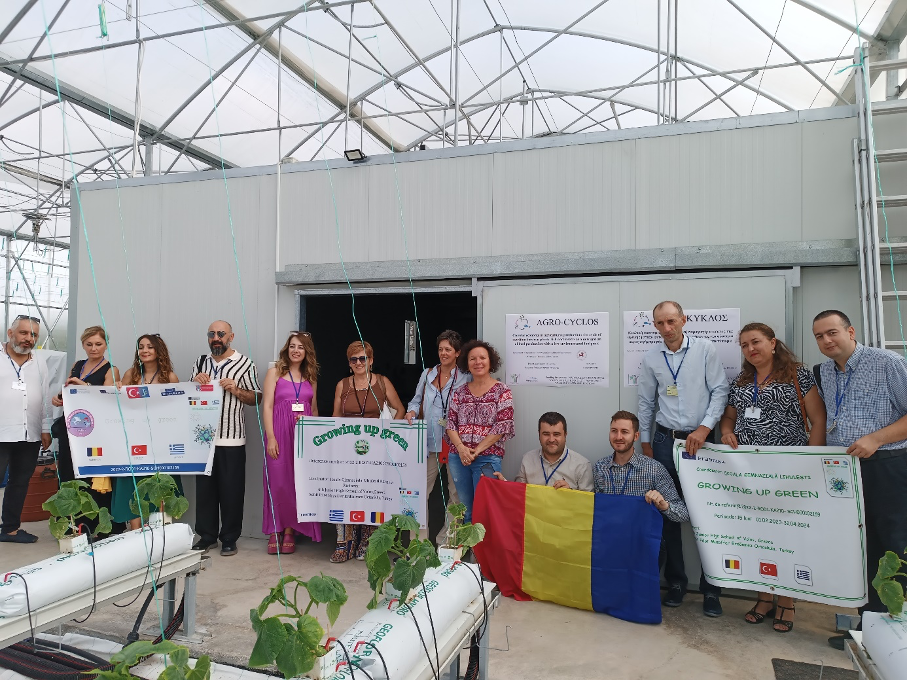
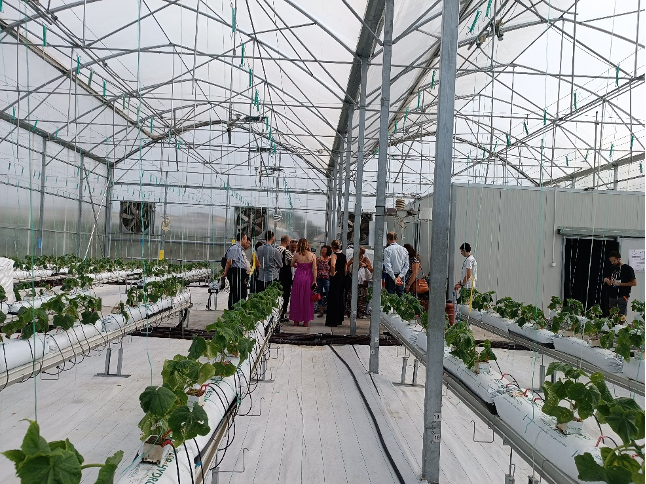
- 27-29/9/2023 Oral presentation of Efi Levizou at the Retaste Conference
Oral presentation of the Agro-cycle Coordinator, Associate Professor Efi Levizou, at the International Conference Retaste: Rethink Food Resources, Losses, and Waste -Third International Conference, Athens, Greece (27-29/9/23). The concept, objectives and expected results of Agro-cycle were presented under the title: «Circular economy in agricultural production: the cycle of nutrition between plants, fish and insects as a new system of food production with low environmental footprint».
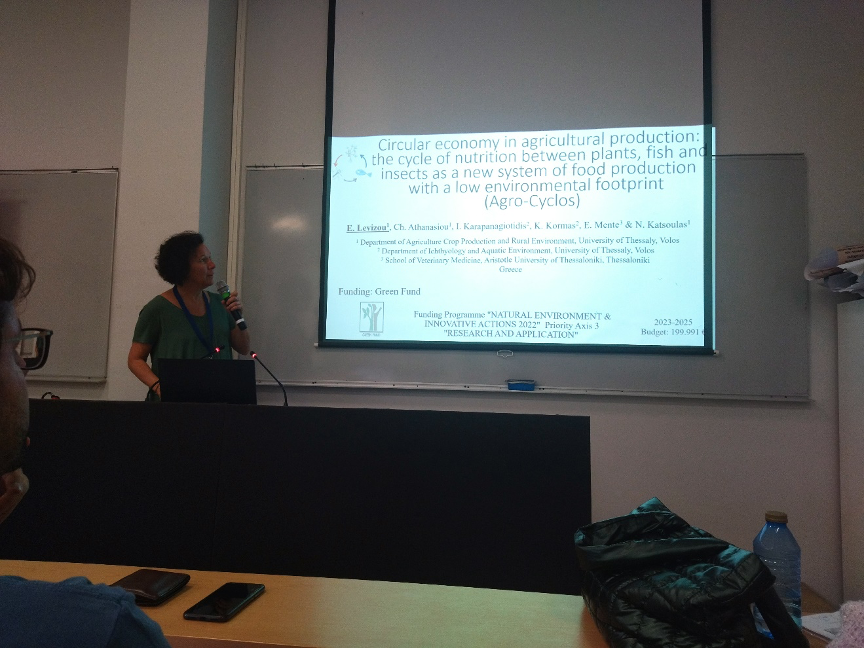
On 20/5, an "Open Day" was held, offering the public free access to the facilities of Agro-Cycle. On that day, approximately 50 individuals visited the facilities.

Photos of the visit of the Vice Rector of the University of Thessaly Prof. Providas and the Dean of the Faculty of Agricultural Sciences Prof. Plageras. On the right photo a poster of the Green Fund at the facilities of the Agro-Cycle.

Networking activities at the national level included two meetings held in April 2024. The purpose of these meetings was to communicate the concept and initial results of Agro-Cyclos. The first one was with the owner of "Ktima Bioma" in Aridaia, Macedonia, a large greenhouse crop business. The second was with the Head of the Department of Field Crops and Ecology of the School of Agriculture of the Aristotle University of Thessaloniki.
Photo material of the collaboration meetings in the context of WP8.
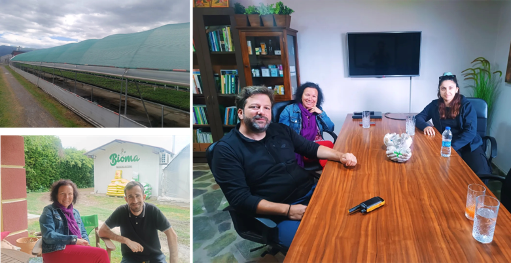
Photos from the visit to “Ktima Bioma”, with the owner, Mr. Machairidis, on the right.
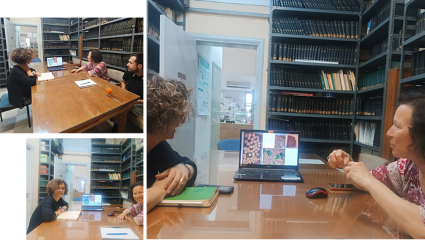
From the visit to the School of Agriculture of the Aristotle University of Thessaloniki. On the left of each photo is Professor Karamanoli.
Photos related to the participation in international and national conferences in the framework of WP8.
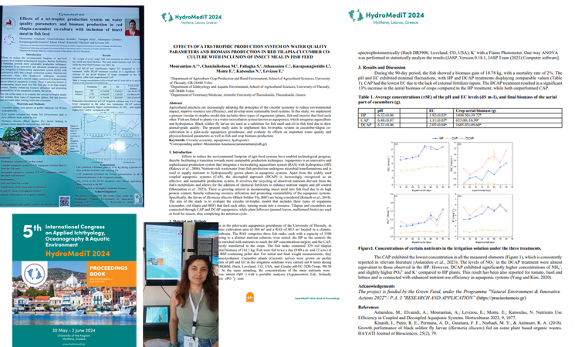
Hydromedit 2024 International Conference in May 2024 in Mytilene. Presentation by Anastasia Mourantian.

AgEng 2024 International Conference in July in Athens. Two presentations were made: an oral one by E. Levizou and A. Mourantian and a poster by M. Chatzinikolaou.
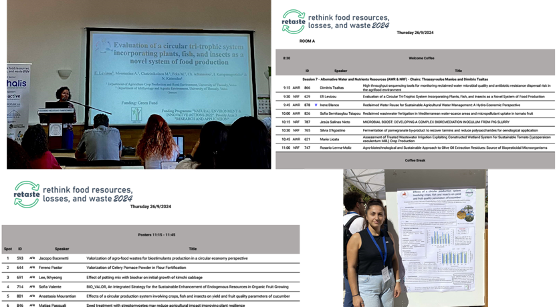
Retaste 2024 International Conference in September 2024 in Heraklion, Crete. Two presentations were made: an oral one by E. Levizou and and a poster by A. Mourantian.
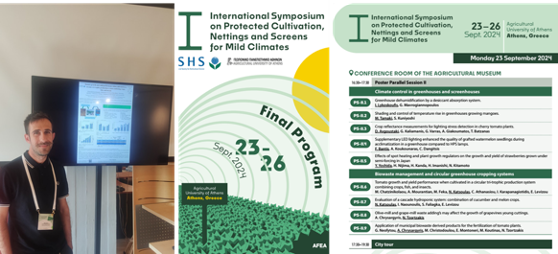
PROMICLI 2024 International Conference. Michalis M. Chatzinikolaou presented the results of Agro-Cyclos tomato experiment.
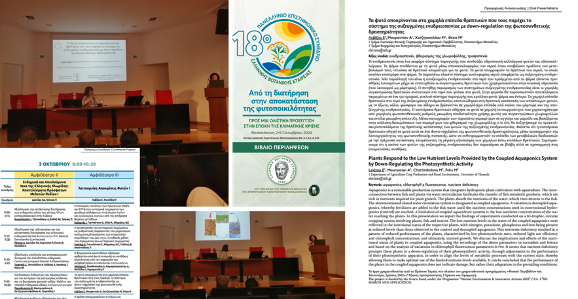
Greek conference of the Hellenic Botanical Society. Efi Levizou presented the findings of the Agro-Cyclos experiments in relation to plant physiology results.






https://e-thessalia.gr/stin-agro-thessaly-o-kosmos-agkaliase-ton-agro-kyklo/
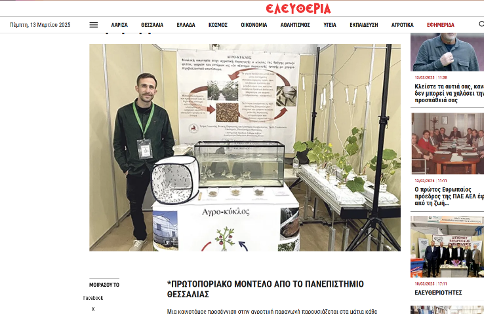
https://www.eleftheria.gr/αγρο-κύκλος-στην-πρωτογενή-παραγωγή
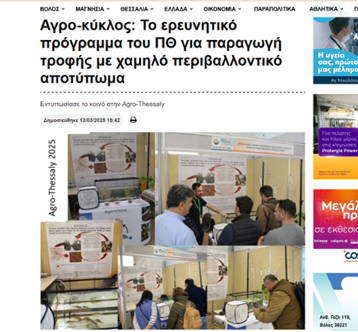
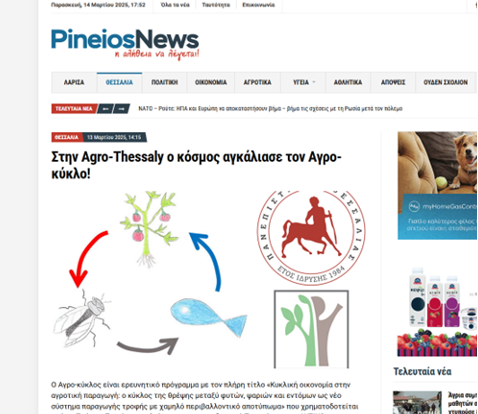
https://www.pineiosnews.gr/2025/03/13/stin-agro-thessaly-o-kosmos-agkaliase-ton-agro-kyklo/
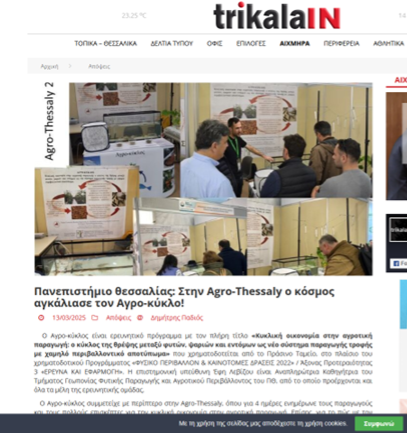
https://trikalain.gr/panepistimio-thessalias-stin-agro-thessaly-o-kosmos-agkaliase-ton-agro-kyklo/
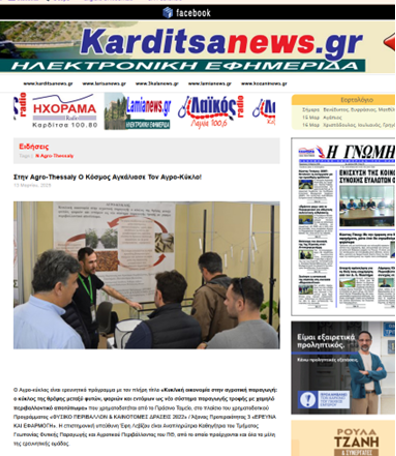
https://www.karditsanews.gr/stin-agro-thessaly-o-kosmos-agkaliase-ton-agro-kyklo/
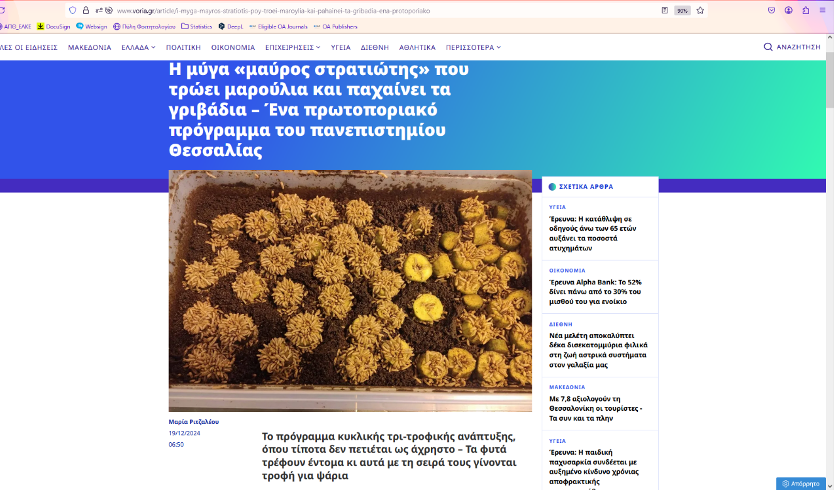
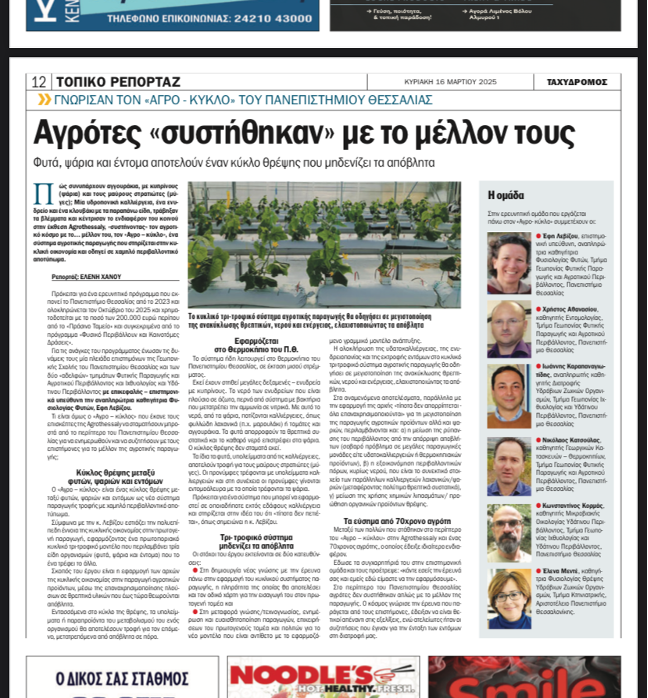
Keep in touch through our site for Dissemination & Outreach updates!
- 20/5/2023 The pilot aquaponics greenhouse
The pilot aquaponics greenhouse, located at the Experimental Farm of the University of Thessaly in Velestino, 20 Km NW from Volos. Its total surface is 500 m2 and consists of the plant cultivation area and a chamber of controlled conditions, where the aquaculture unit is located.
This greenhouse will host the experiments of Agro-cyclos and will be open to visitors during the outreach activities.
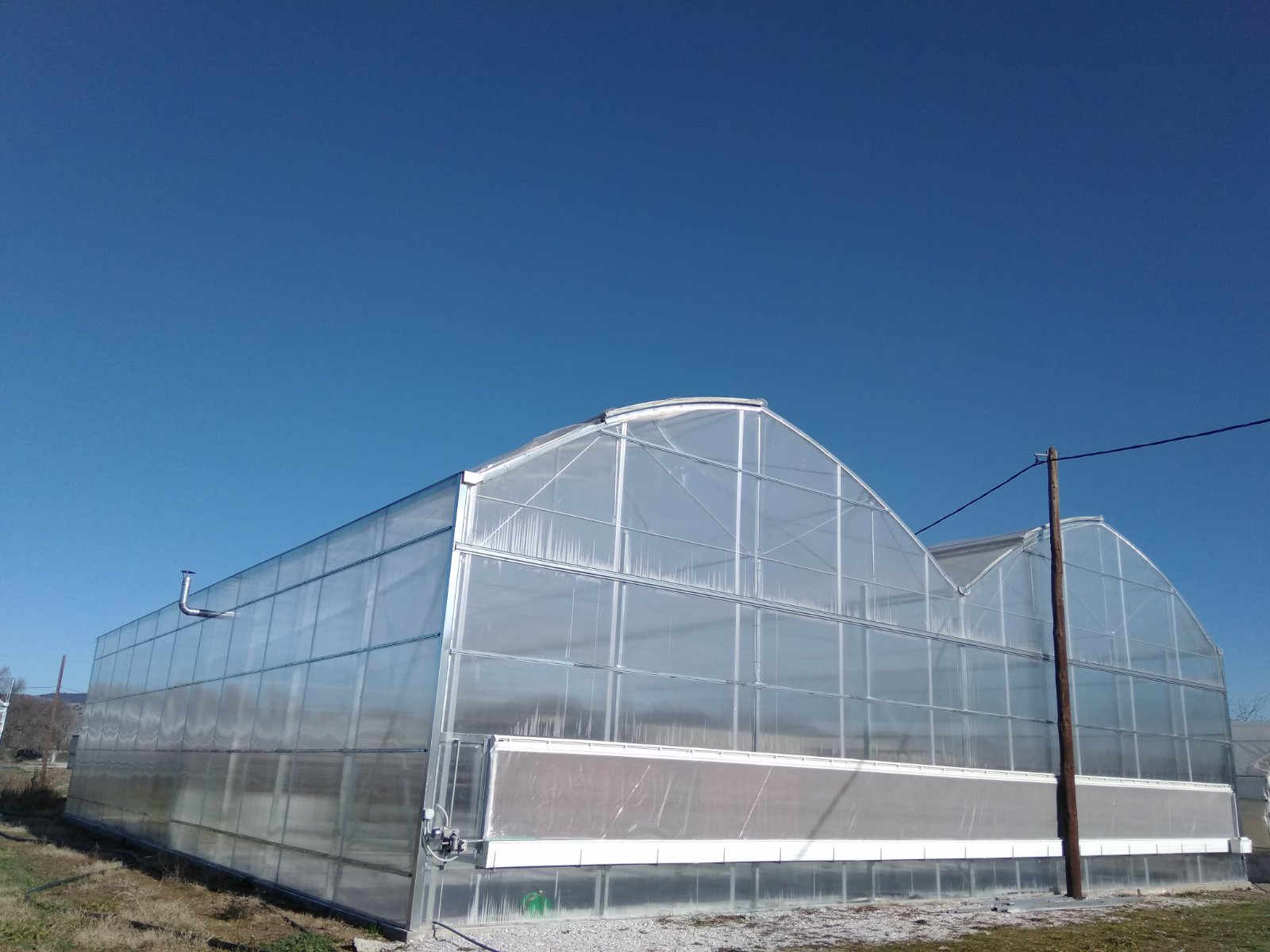
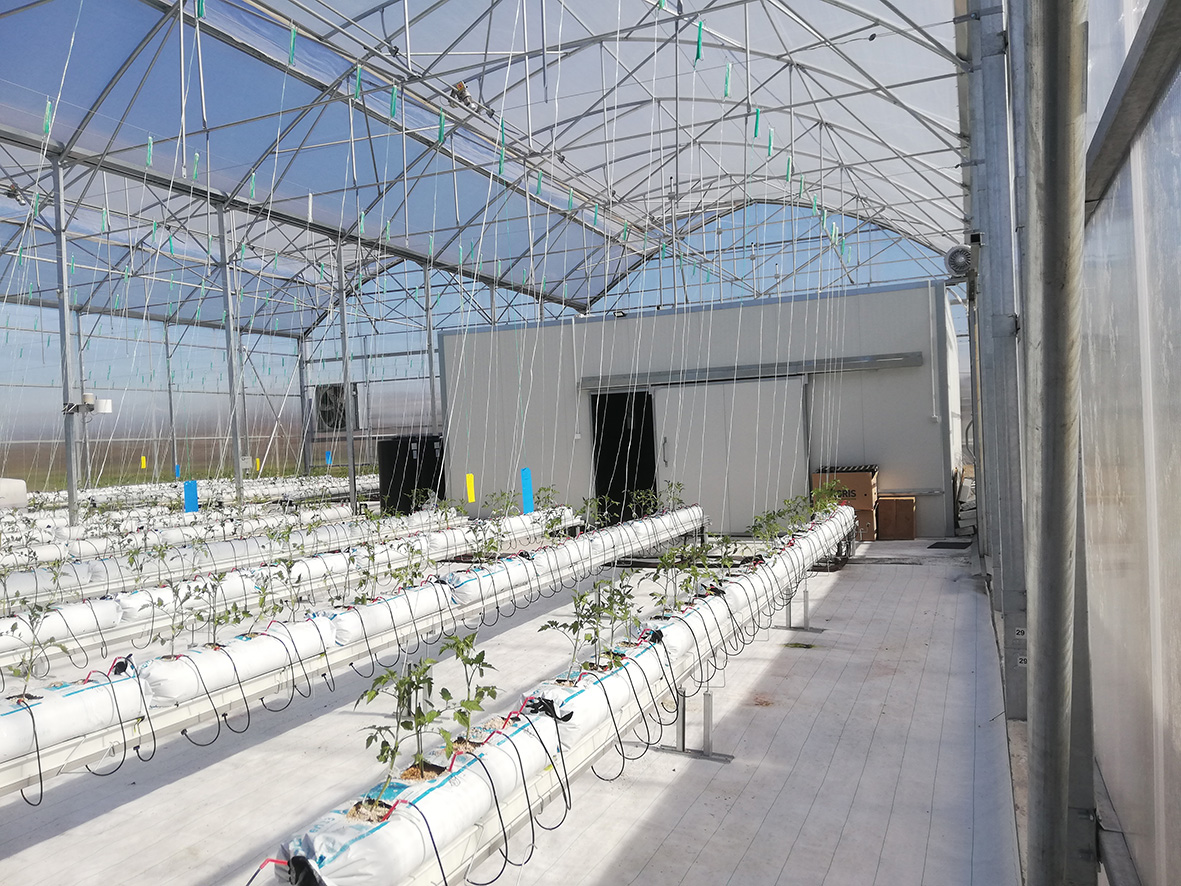
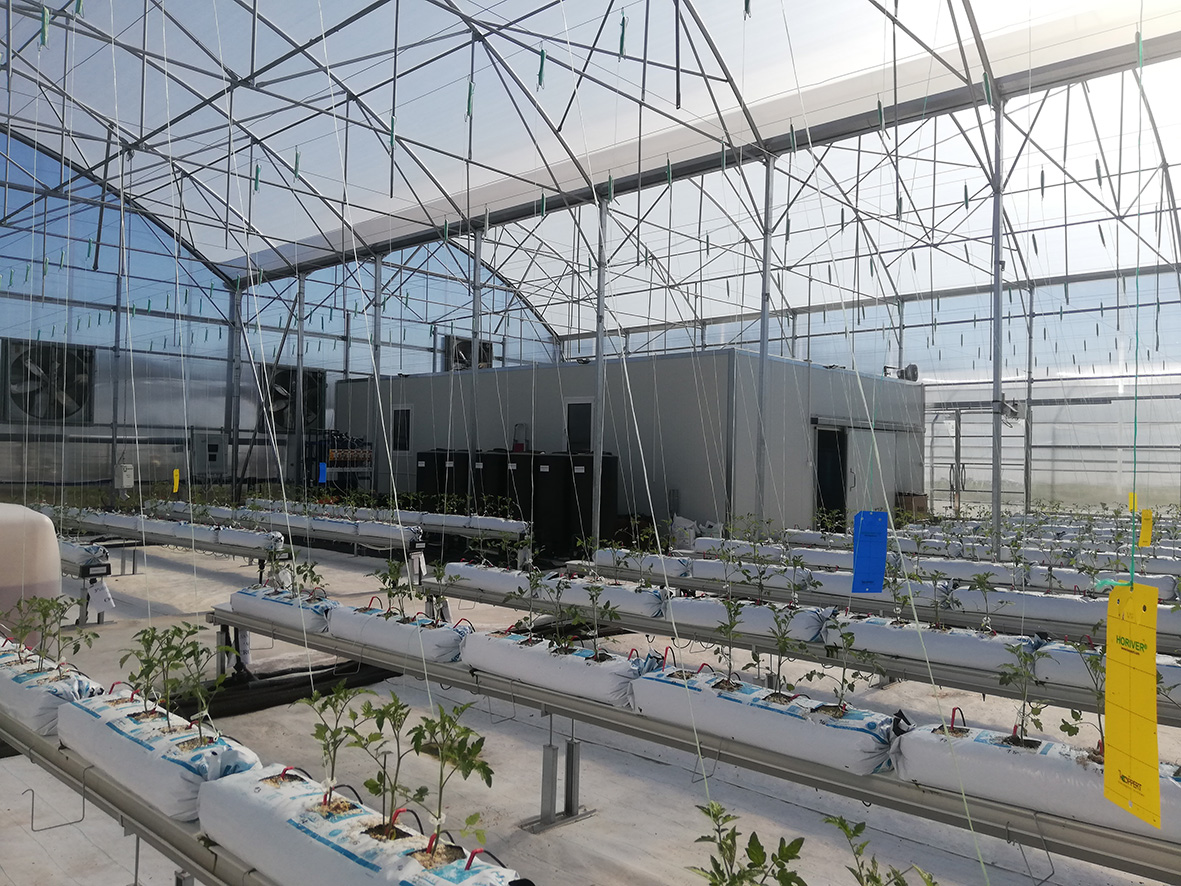
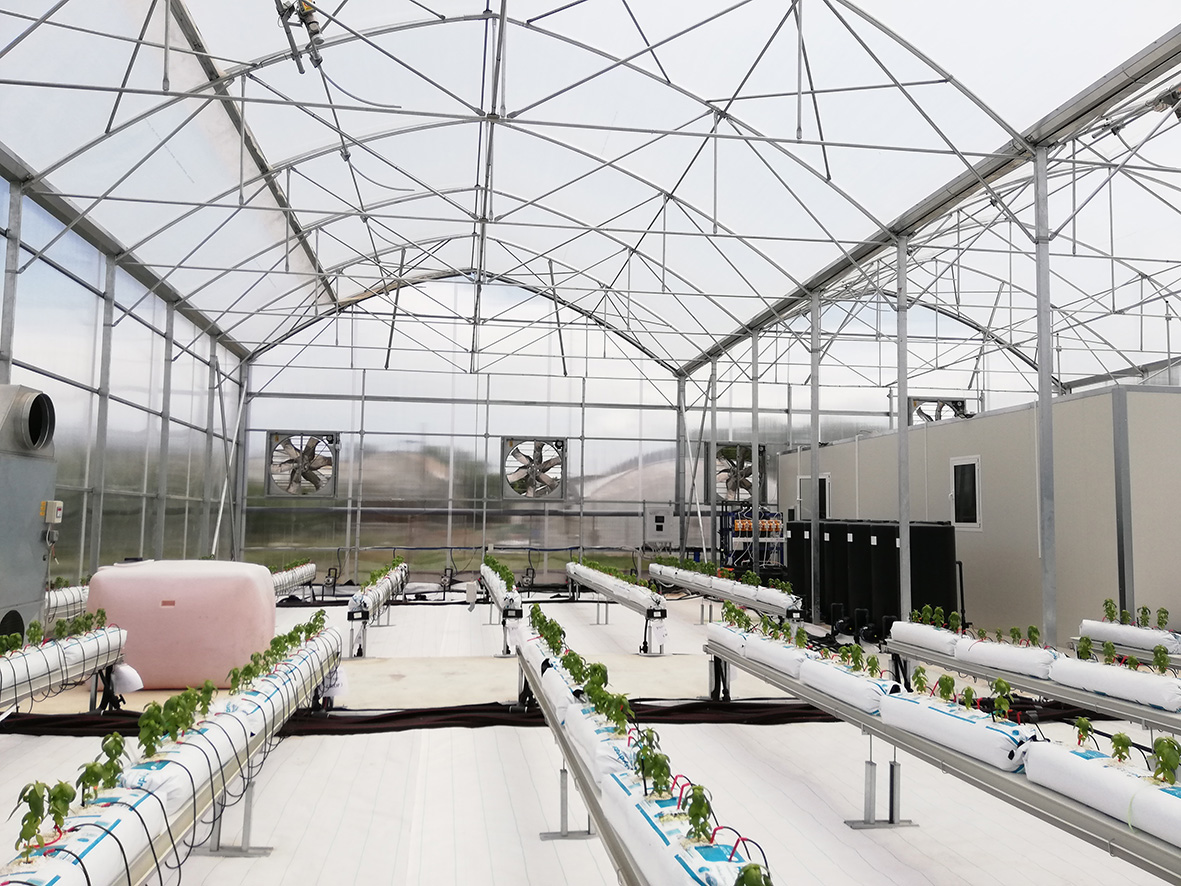
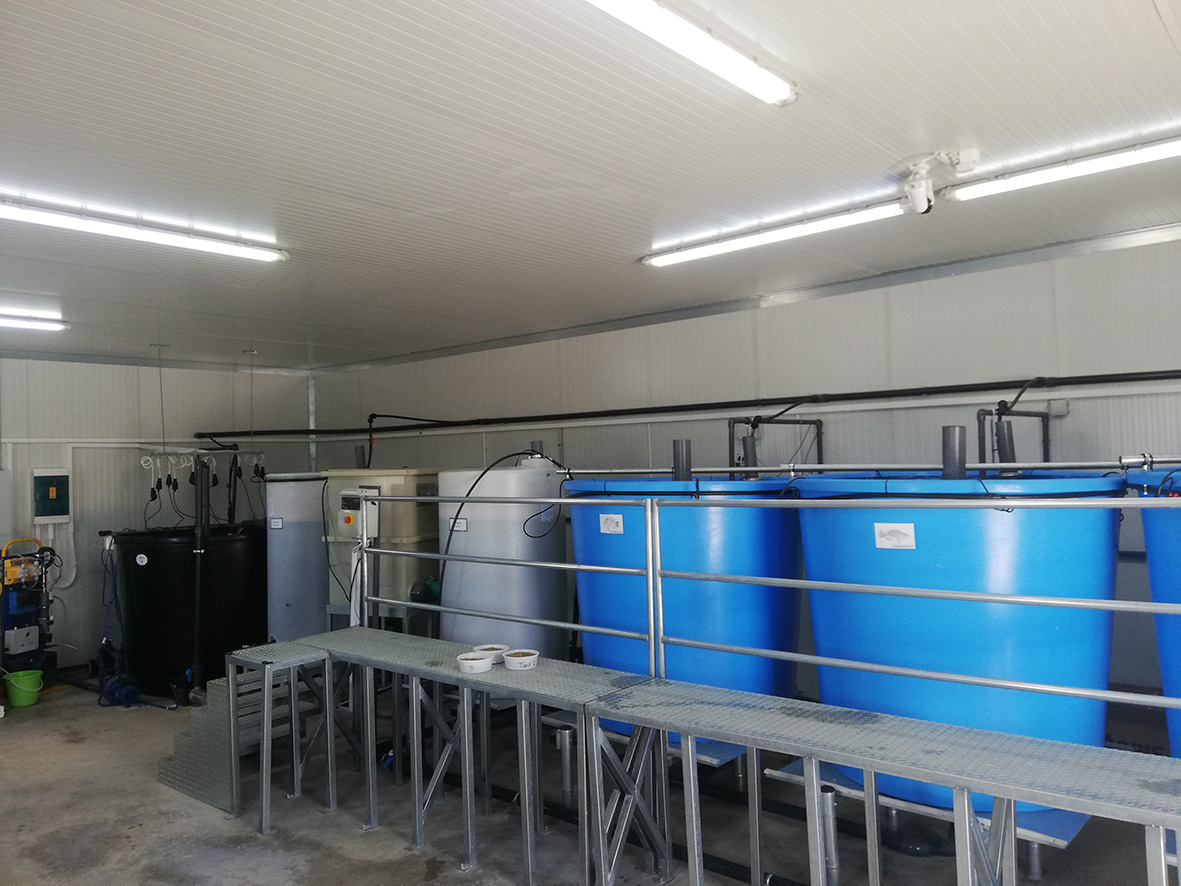
Inside the greenhouse is the fish farming unit – part of the aquaponics system: the blue tanks are used for rearing fish, while the other tanks constitute a system of interconnected biological and mechanical filters.
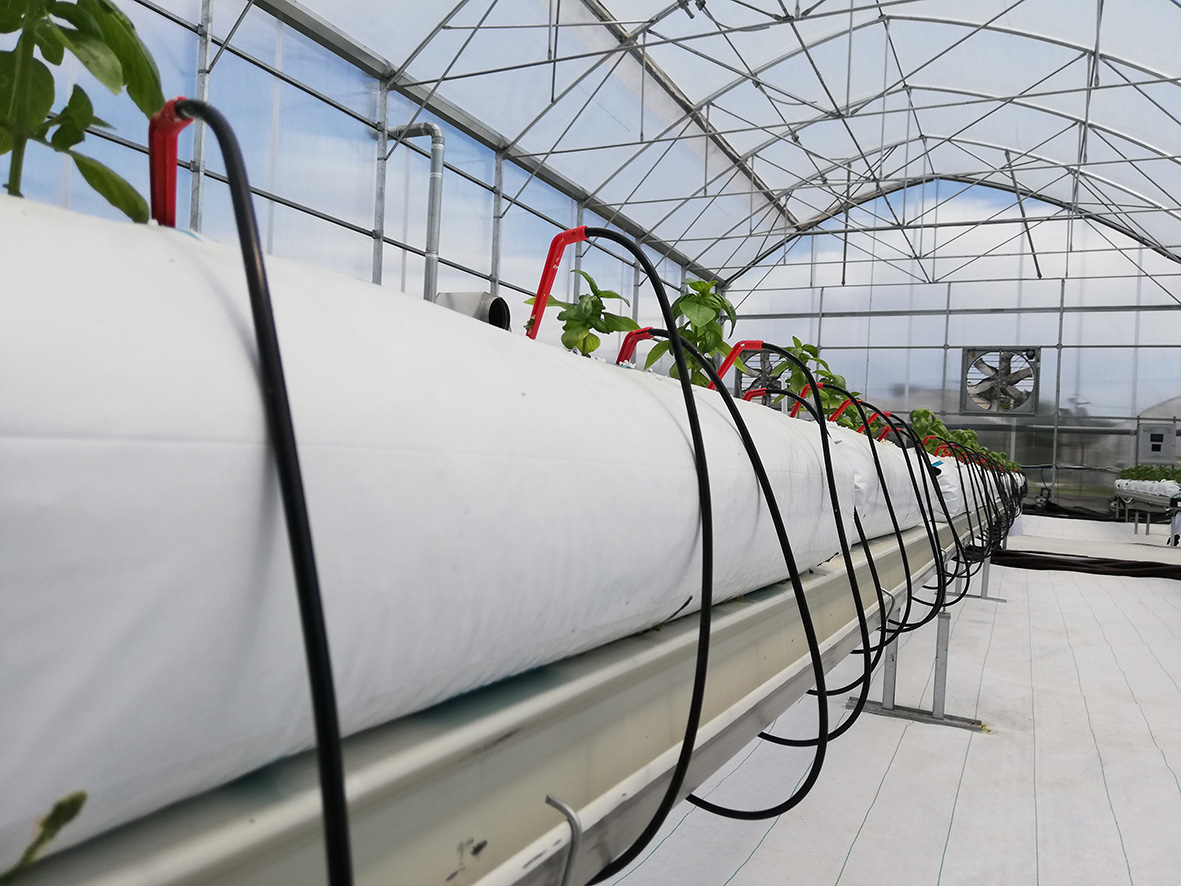
- July and August 2023. Installation of the insect rearing system
During July and August, the integration of the Agro-cyclos system was concluded with the installation of the insect rearing system.

The insect rearing chamber.
- August 21 of 2023: Black soldier fly larvae on site
On August 21, 2kg of Hermetia illucens larvae were transferred to the new rearing system from the Laboratory of Entomology and Agricultural Zoology of the Department of Agriculture Crop Production and Rural Environment of the University of Thessaly. The larvae were placed in special rearing trays. Some of these larvae will be bred to conclude their life-cycle and produce eggs, though most of them will be directed to the production of insect meal, which is an important component of fish feed. The latter is used to feed the fish (tilapia) of the Agro-cycle.
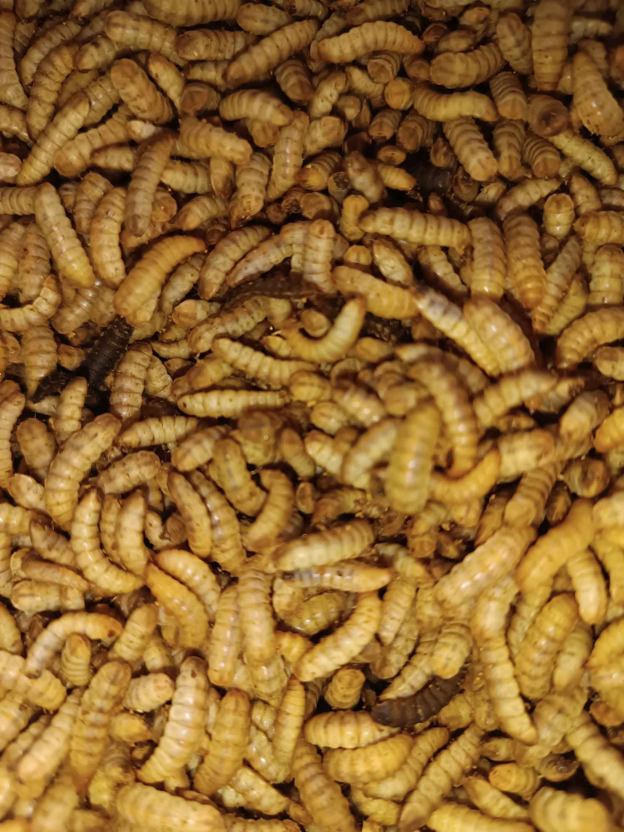
Black soldier fly larvae.
Inside the insect rearing chamber, except of the larvae trays there are two cages. The first one (photo below) is the Dark cage where the life-cycle after the pupae stage is completed.
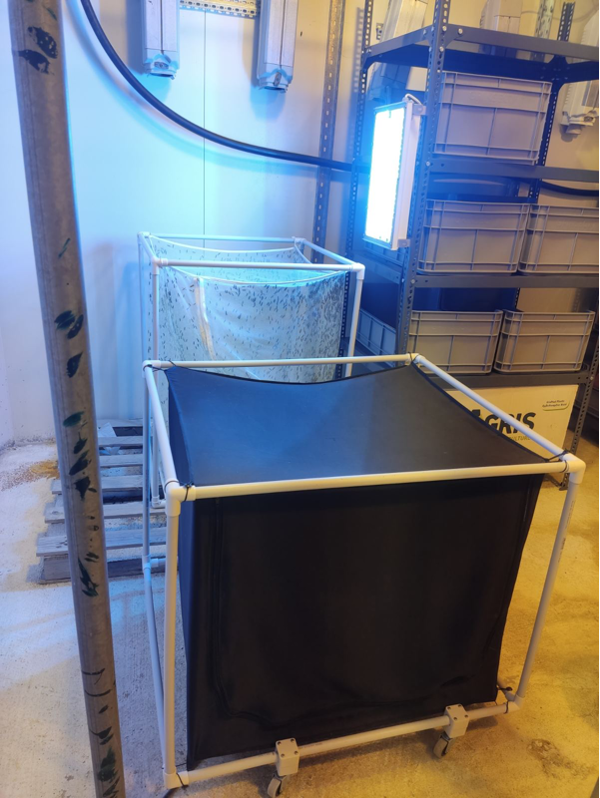
The Dark cage (front) where the life-cycle after the pupae stage is completed.
The second cage is called Love cage, since it is the place of mating and reproduction of flies. They lay their eggs in specific materials (wooden sticks ect.), which we have placed in the cage. Dark cage and Love cage are interconnected permitting the transfer of adult flies from the first to the second for the reproduction process.
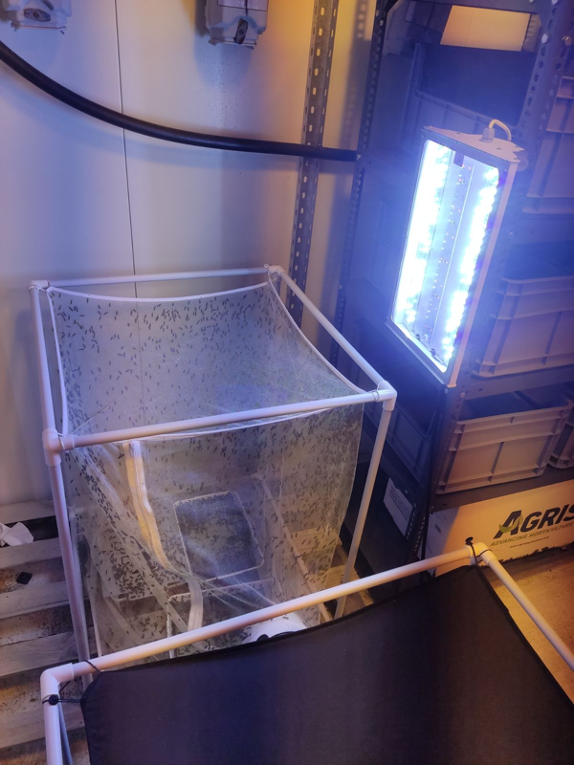
The love cage (back), where the mating and reproduction of flies take place.
- 18/09/2023: The start of the first experiment
On September 18, 2023, the first experiment of Agro-cycle began in the aquaponics greenhouse, with the combined cultivation of cucumber and tilapia. The treatments concern the nutrient solution used for crop irrigation: a) standard hydroponic solution (Control) and b) aquaponics solution which comes directly from the fish tanks, after passing through the (biological and mechanical) filters. The second solution feeds the plants with the nutrients dissolved in it derived from the fish excretions and their uneaten food. Thus, the fish waste becomes a resource for the plant!
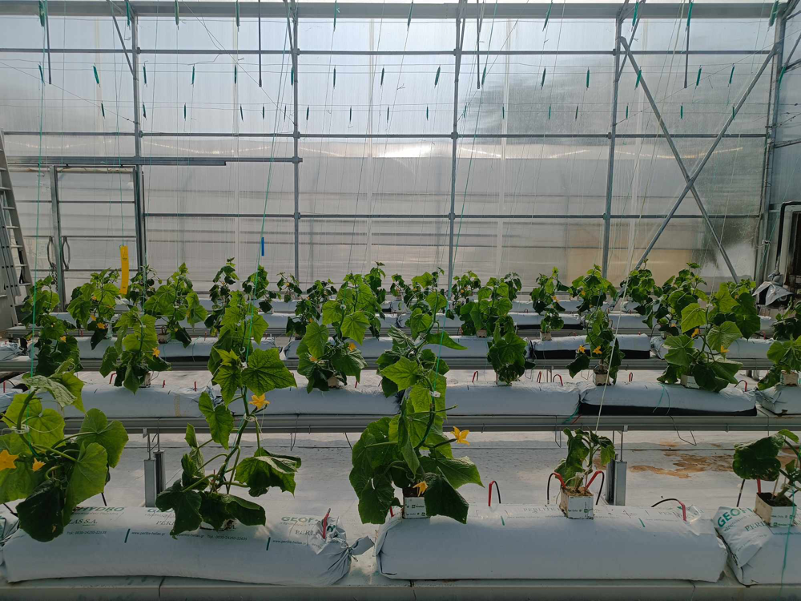
Cucumber plants during the first days of cultivation.
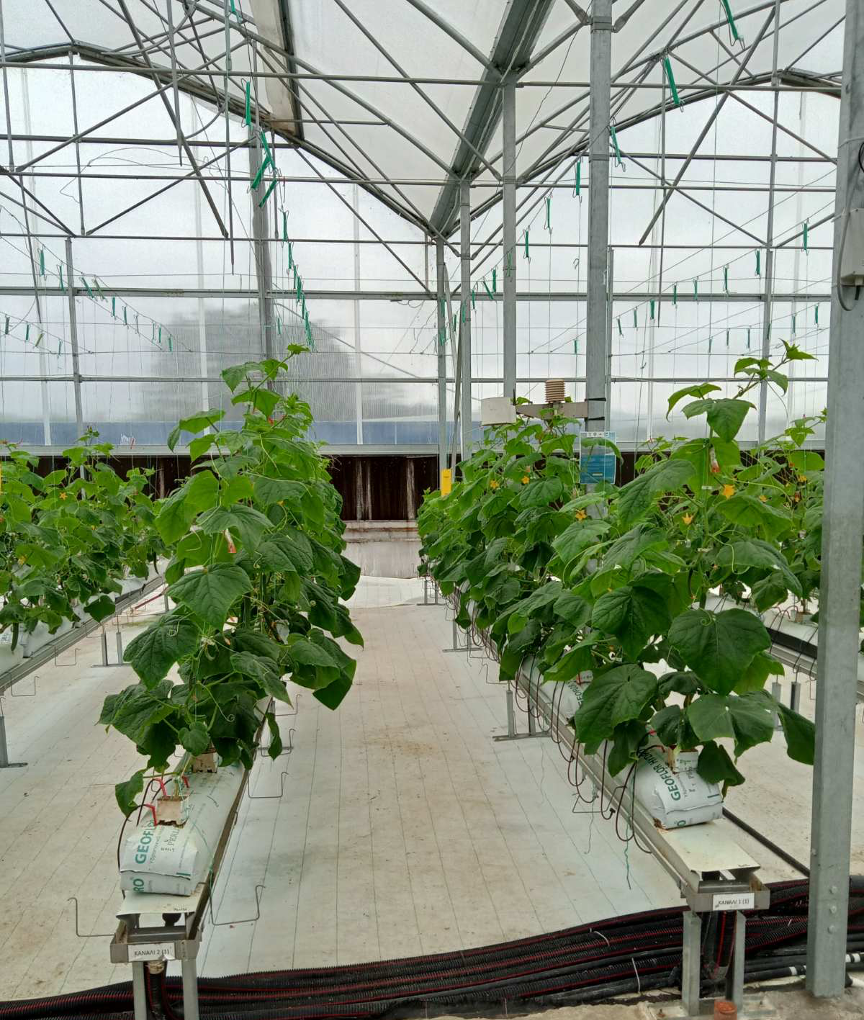
Few days later.
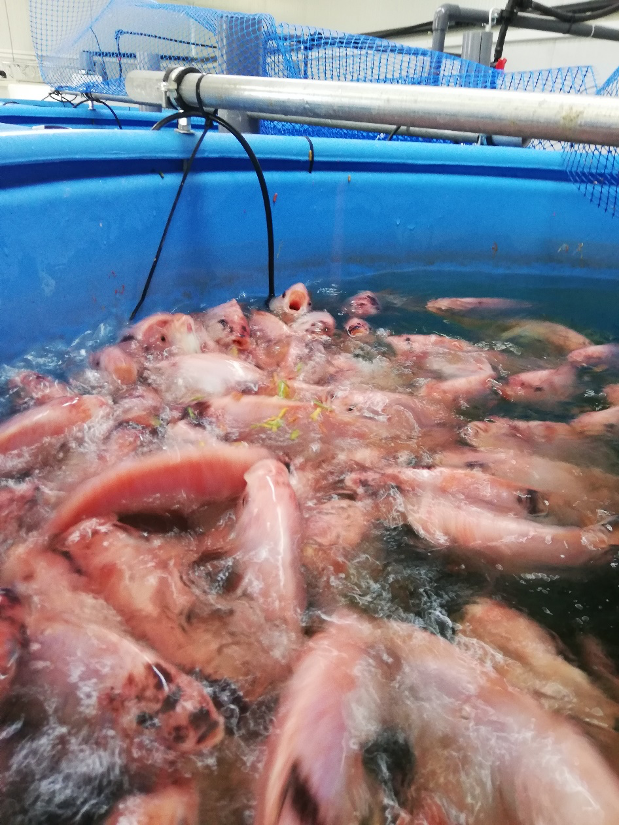
The red tilapis.
Many daily tasks are carried out in the breeding facilities of the black soldier fly:
-) the larvae in the rearing trays are fed with cucumbers and cucumber leaves from the pruning of the crops.
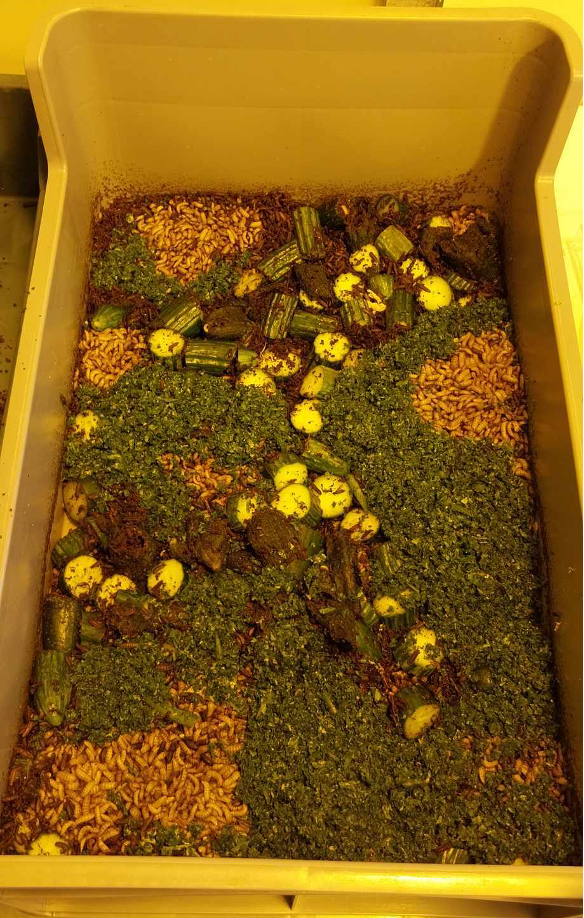
Τhe larvae feed on cucumbers and cucumber leaves
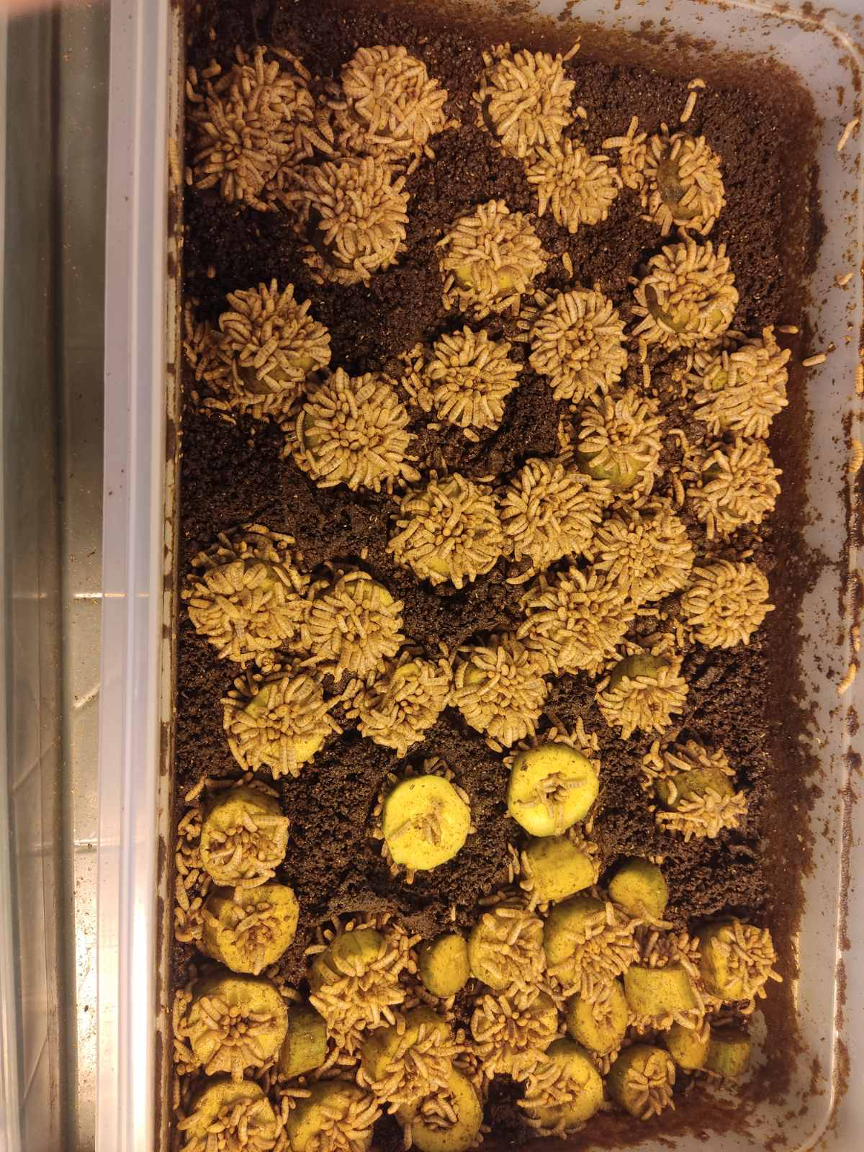
The larvae prefer the soft inner part of cucumbers.
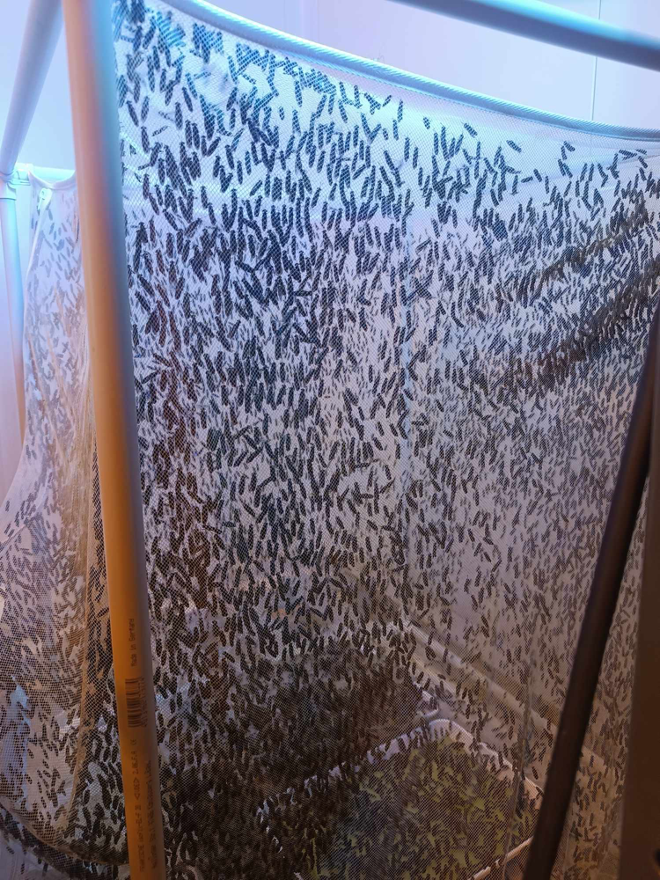
-) the eggs are collected from the Love cage, and placed in boxes with specific food, so that when they hatch the young larvae can feed
-) When the larvae are ready to be harvested, they are separated from the substrate by sieving. Most of them are directed to insect meal production for inclusion in the fish feed, while others are left to develop in the Dark cage to continue their life cycle.
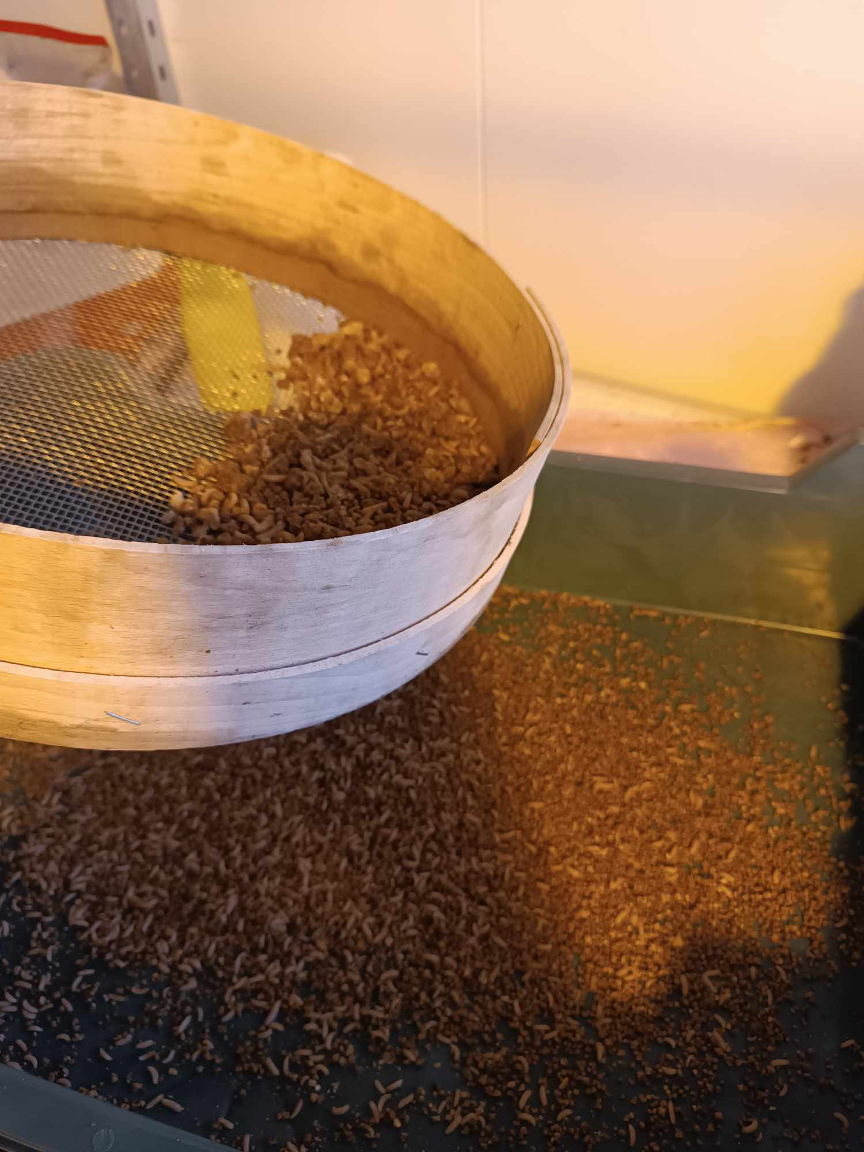
Separation of larvae from the substrate.
- 19/03/2024: Second experiment completed!
The second aquaponics experiment with lettuce cultivation in the Agro-cyclos project has been completed. Lettuce was cultivated for 45 days in parallel with the rearing of fish (tilapia) and the insect Hermetia illucens (black soldier fly). Three treatments were tested: hydroponics (as a control), coupled and uncoupled aquaculture. Plant growth and physiological measurements were performed during the experiment.
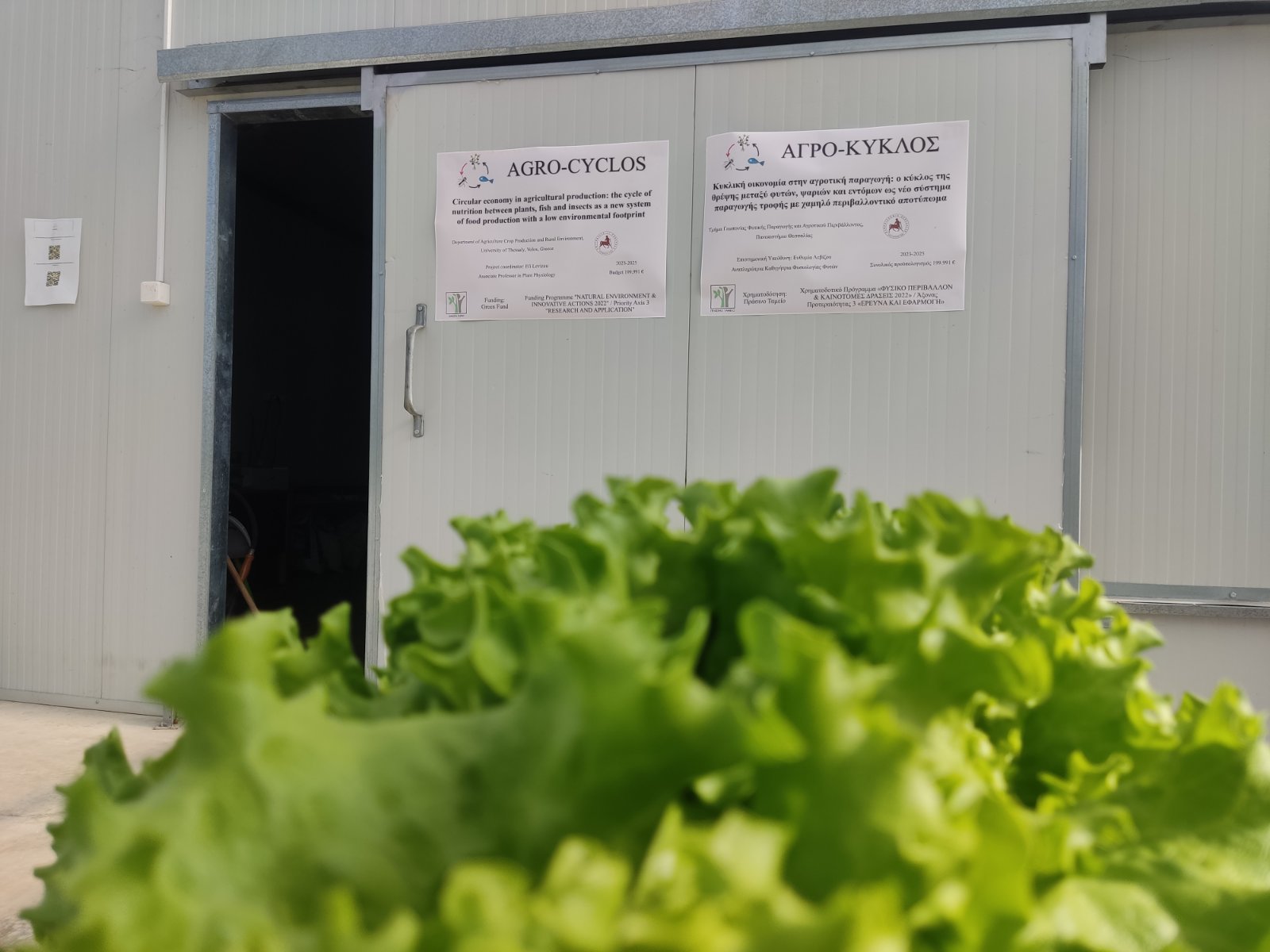
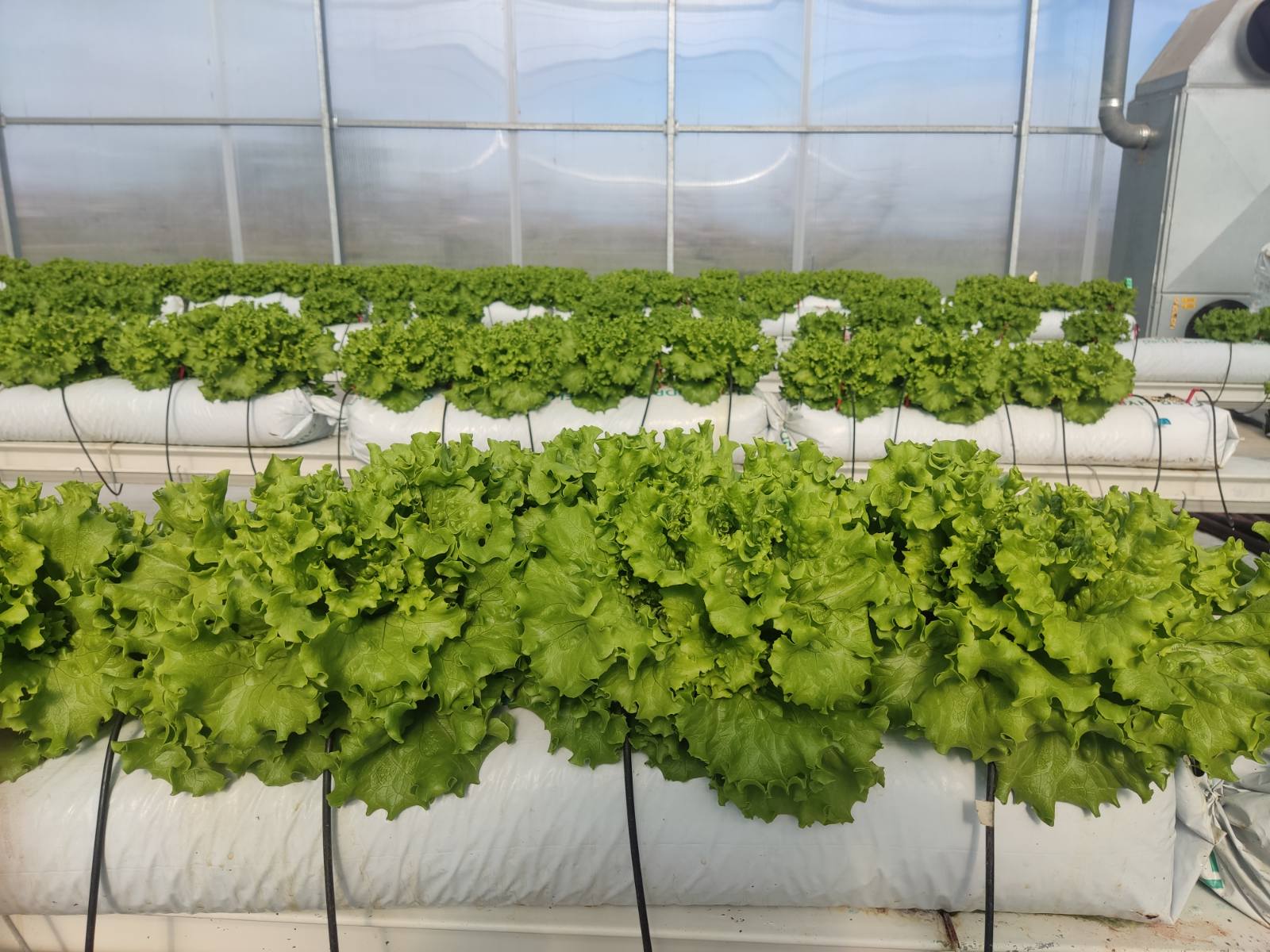
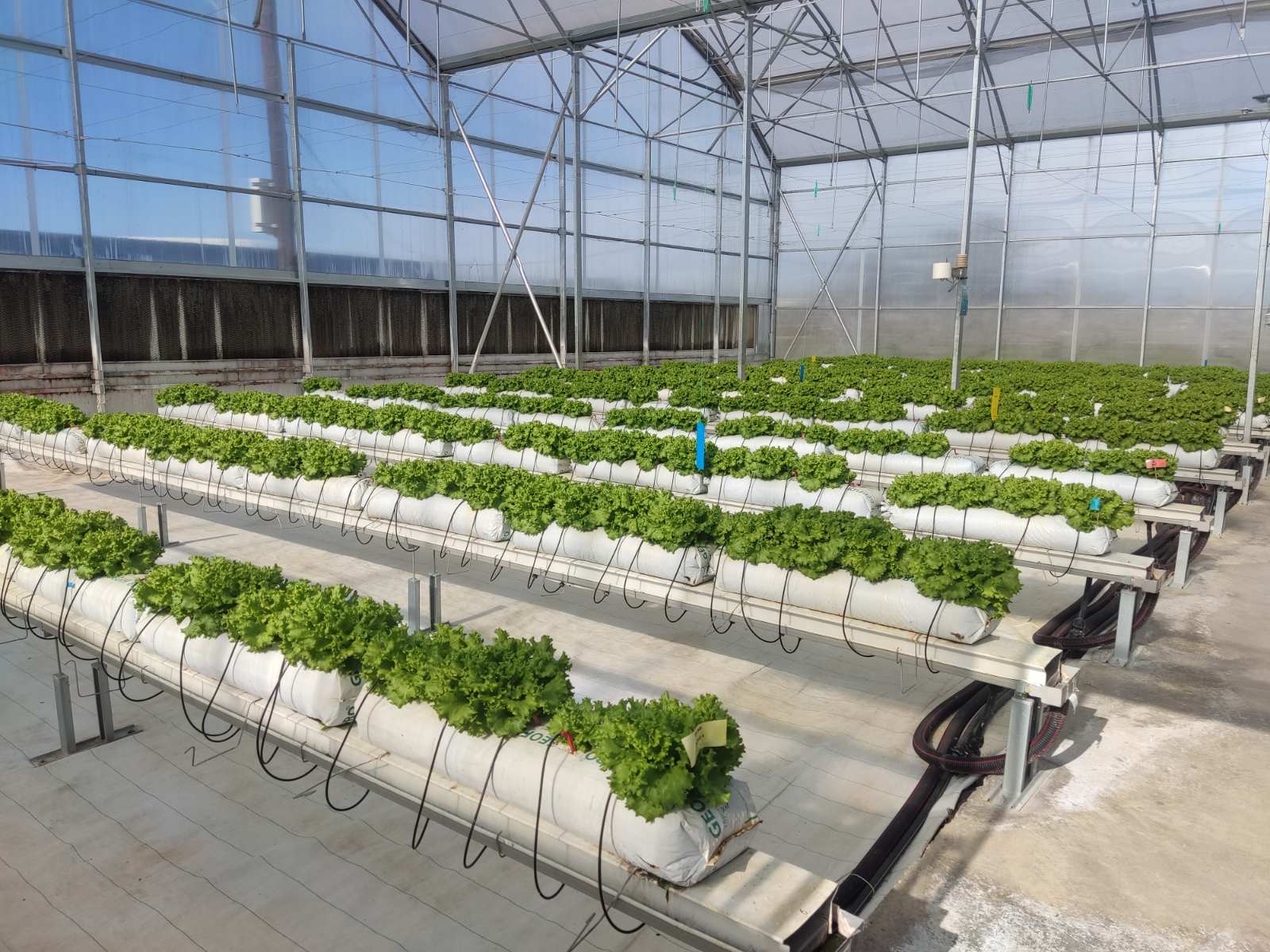
The images below come from the insect breeding chamber. On the left, the love cage is full of black soldier flies, while on the right, wooden sticks are visible, on which the flies have laid their eggs. The eggs will hatch and fall into the nutrient medium below, where the larvae will feed and grow. Eventually, they will become insect meal to feed the tilapia fish of the experiment.
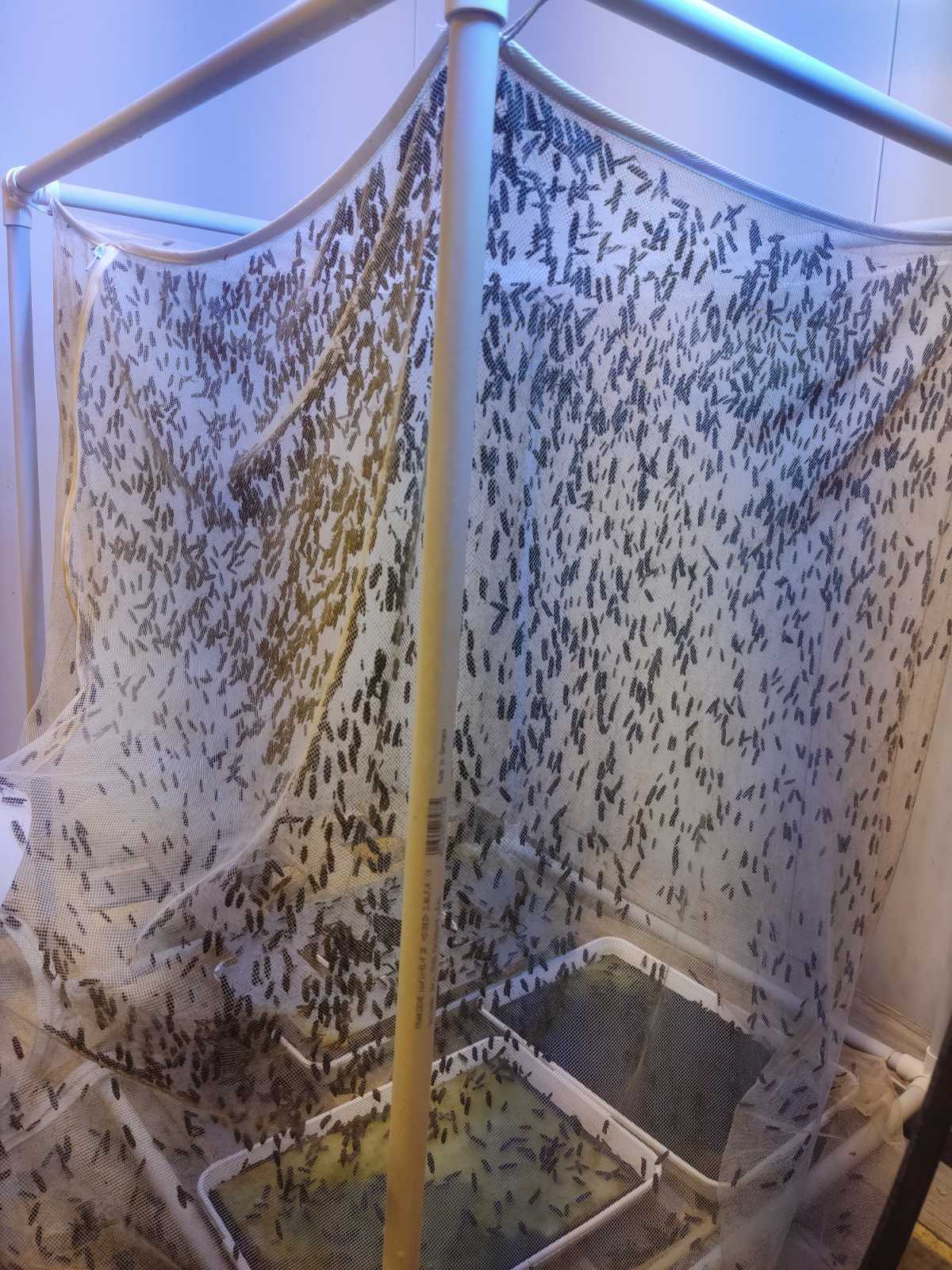
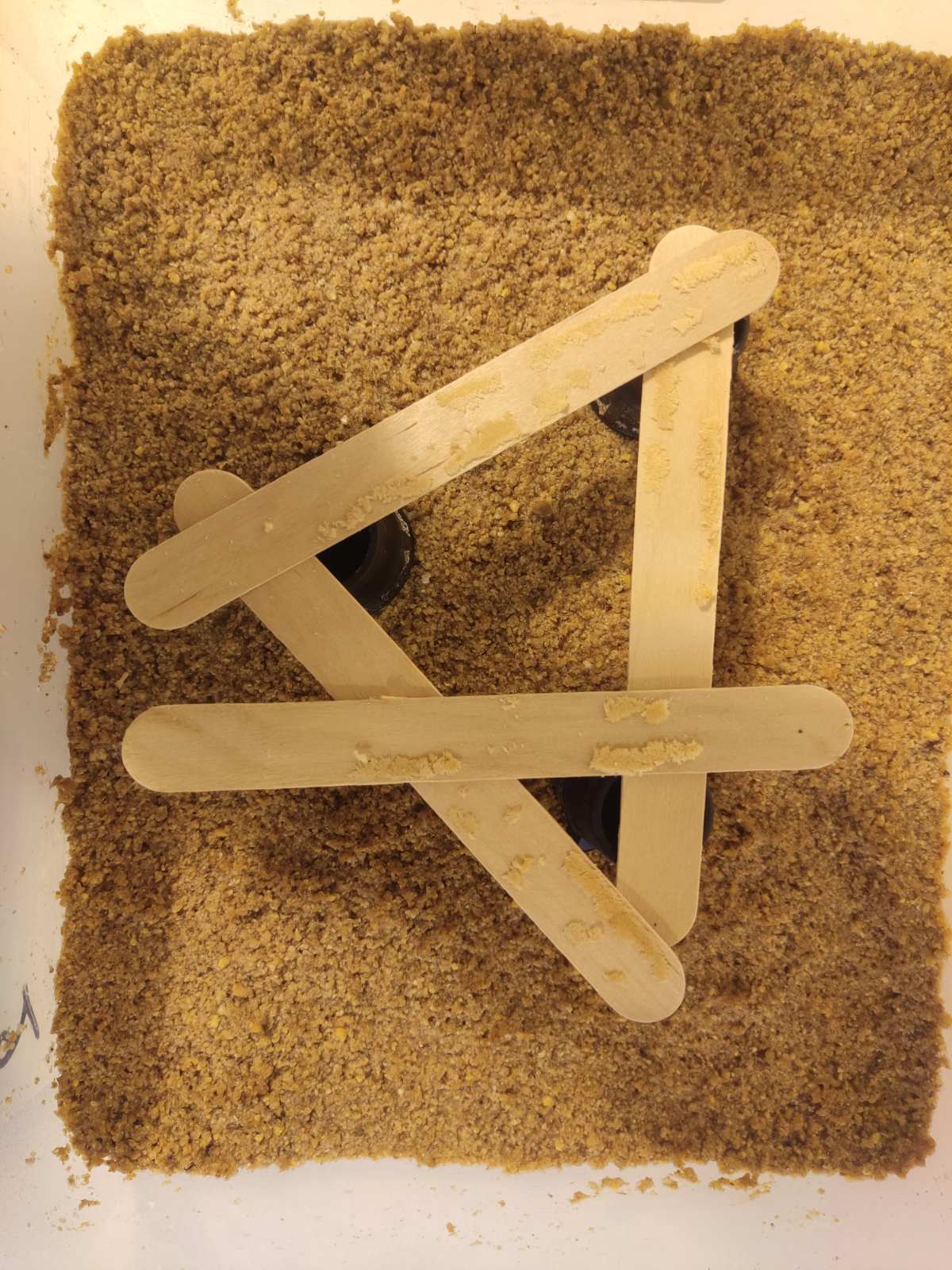
- The WP5 (Tomato cultivation) commenced on 1 April and was concluded in September 2024.

ANNEX II
Open week activities (WP8)

Secondary school visits in the context of Agro-cycle paricipation in the University of Thessaly "Open Days"

University student visits in the context of Agro-cycle paricipation in the University of Thessaly "Open Days"

Visit of the Advanced Elementary School of Portaria.

Visit of the 2nd Special Elementary School of Volos.
We'll keep you posted for upcoming events!!!